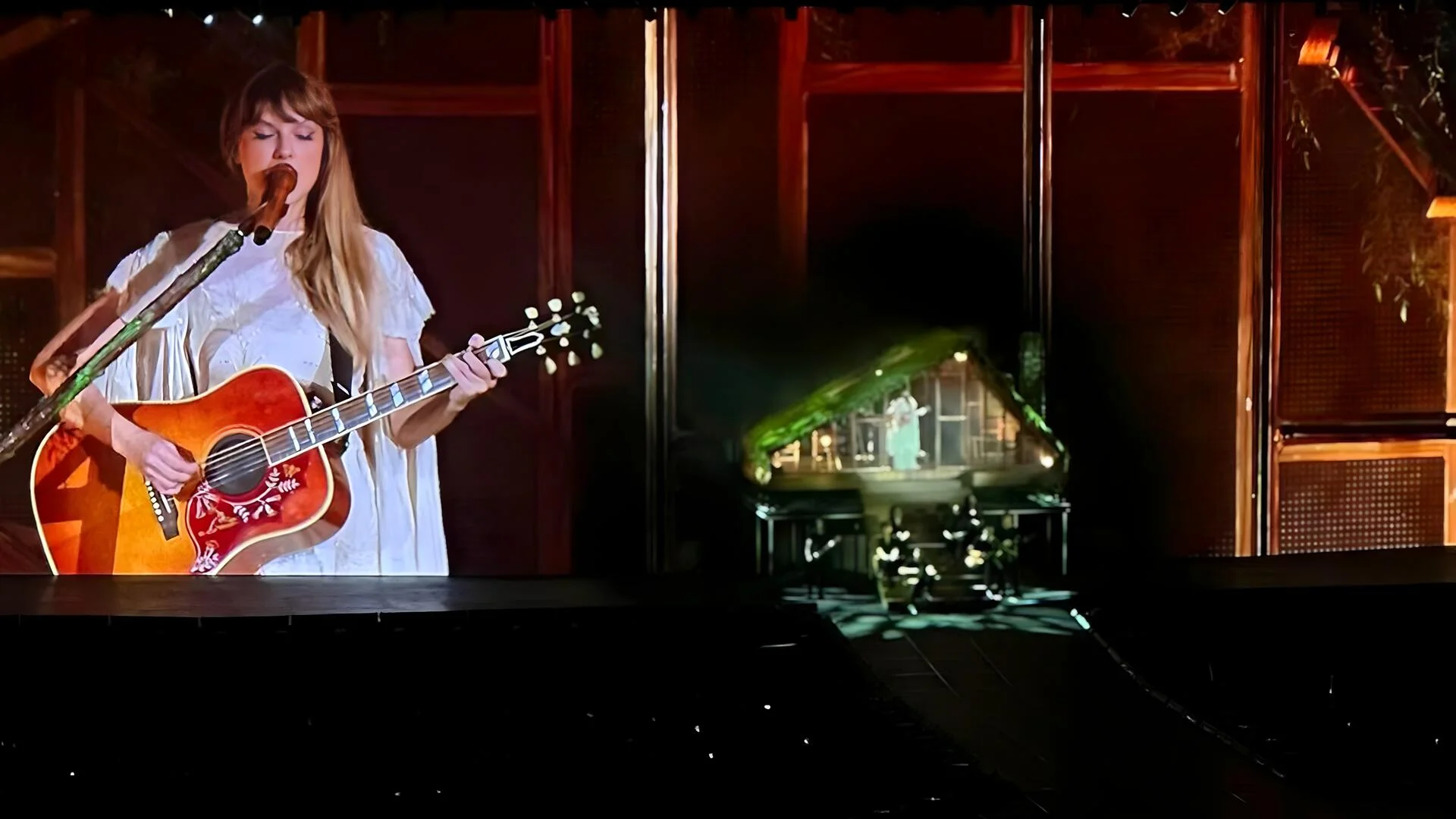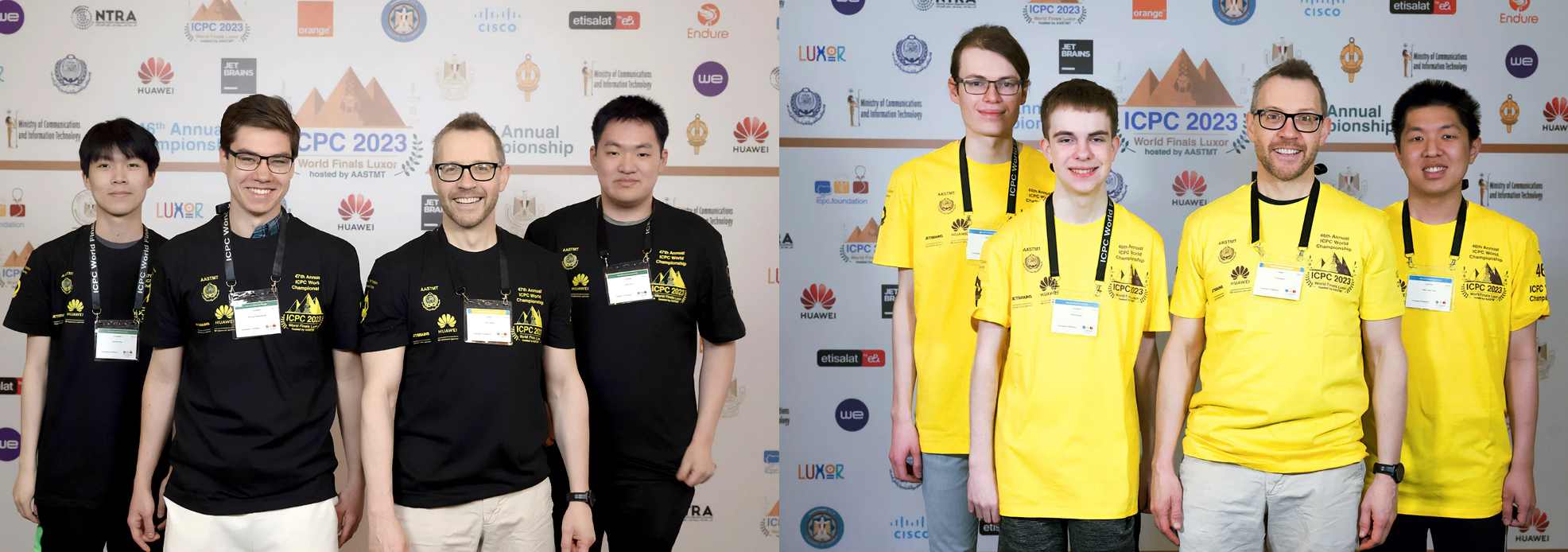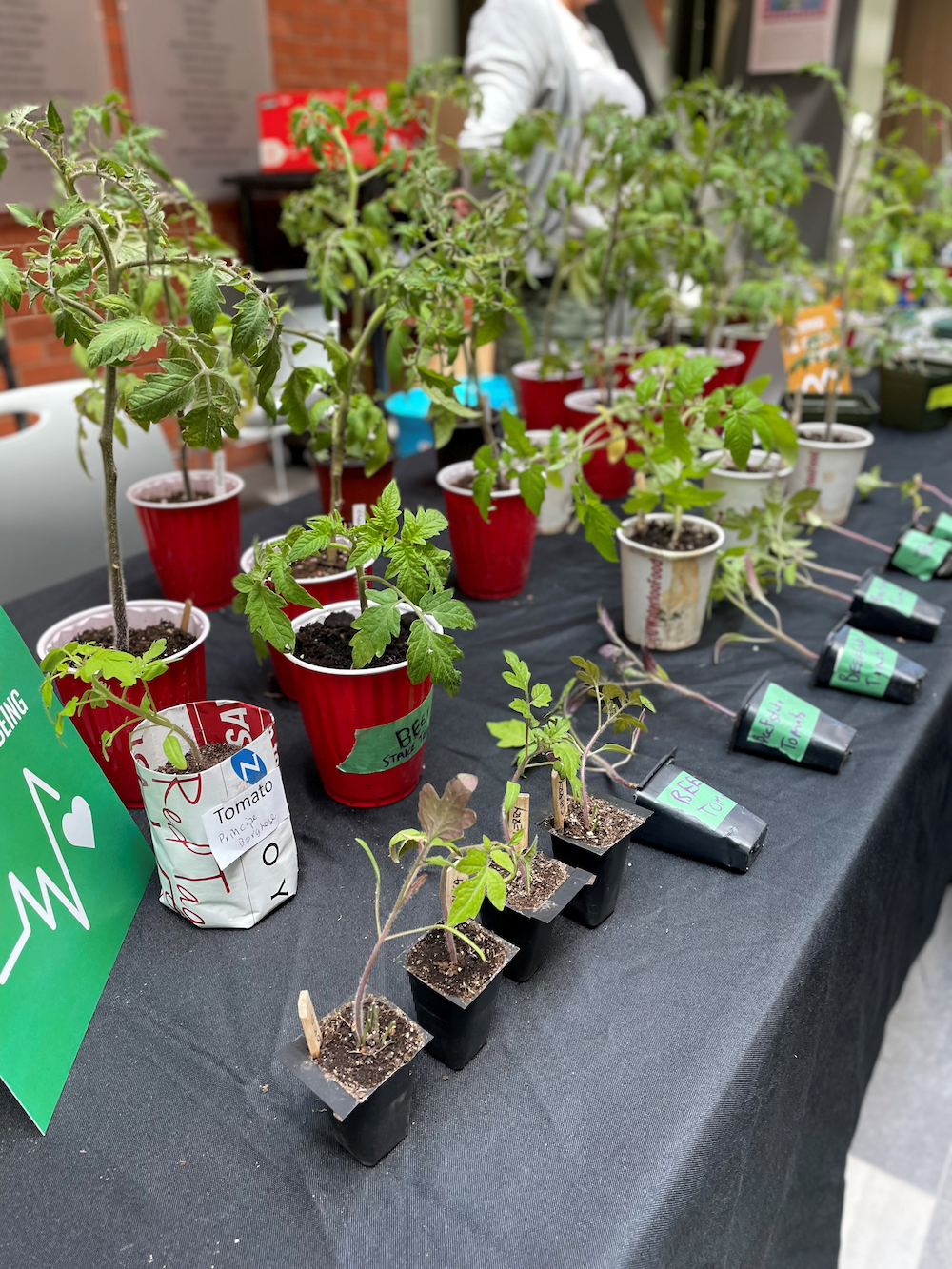Editor:
Brandon Sweet
University Communications
bulletin@uwaterloo.ca
Taylor Swift and the heartbreak ballads we know all too well

By Angelica Marie Sanchez. This is an excerpt of an article that originally appeared on Waterloo News.
Do you really want to know what we were doing on April 19? Listening to Taylor Swift’s double-album release, The Tortured Poets Department: The Anthology, of course.
Swift’s latest synth-pop album, The Anthology, includes 31 new songs that have both fans and critics flipping through a dictionary, while experiencing emotional resonance through her masterful lyrics — inspired by the five stages of grief. While Swift has become one of the most famous singers and songwriters worldwide, some psychologists and cognitive scientists can’t help but to question why we find comfort in listening to sad songs?
“Music isn't just a matter about making people feel good, it's about making them be aesthetically engaged,” says Dr. Paul Thagard, cognitive scientist, full-time writer and distinguished professor emeritus of philosophy at the University of Waterloo.
"What makes the sad songs so powerful for us is that they engage our emotions. Because we've all been sad for various reasons and [these songs] tap into that and reminds us [of our emotions], and in some cases, it can help us work through that.”
In his upcoming book, Dreams, Jokes and Songs: How the Brain Builds Consciousness, Thagard explains how different areas of our brain can synchronize and coordinate neural activity to generate conscious experiences. This includes how we connect with sad songs that evoke strong emotions.
While the internet has recently shown that generative AI can write music and lyrics, Thagard says that AI is missing one important element that makes a great song — emotions. Being able to connect sad songs with emotions, the same way artists portray their feelings within their art and paintings, is one thing that AI cannot accurately replicate. Where emotions are a valuable part of the human experience.
What makes a great song that you know all too well?
If a song has both a catchy melody and generates powerful emotions, it is more likely to stick in our minds and encourage musicians to repeat the same music style. Thagard believes our favourite songs often come from our emotionally intense teenage years or other emotionally driven parts of our lives.
In chapter five of his upcoming book, Thagard uses Swift’s song All Too Well (10-Minute Version), specifically referencing her performance on Saturday Night Live (SNL), to break down his theory of musical consciousness. Thagard goes into detail on how Swift was able to portray and transmits a wide range of emotions, including sadness, nostalgia, regret, anger, resentment and fear — emotions that are often felt at the end of the relationship. He believes much of the emotionality of All Too Well comes from the power of Swift’s lyrics that resonates and have an emotional impact on the listeners.
But it’s ultimately Swift’s SNL performance, from her varying physical expressions to the guitar playing and the accompanying background singers, and the short film that plays in the background, which illustrates the unravelling love story that also portrays the lyrics, that truly adds to the musical experience. All Too Well (10-Minute Version) is currently a fan favourite on the setlist for Swift’s The Eras Tour.
“Breakup songs are important because breakups are traumatic events in our lives, and how do you handle that? Well, you can't just simply ignore it.” Thagard says.
“One way is to get an idea of what other people have gone through. You can listen to the sad songs or the breakup songs and realize lots of other people have been through the same thing. So, you can get a kind of understanding of their situation, as well as your own understanding of your own situation by working through that.”
Read the rest of the article of Waterloo News.
New peer review and group evaluation tool for student course work rolling out
A message from Information Systems & Technology, Instructional Technologies and Media Services (IST-ITMS)
The University of Waterloo has implemented a new peer review and group evaluation tool, peerScholar, for student course work for the 2024 spring term. Peer review and group evaluation are critical processes used in academic courses to deepen learning while improving performance and credibility of student grades. The current tool, PEAR, a University of Guelph home-grown solution that has been used extensively at Waterloo, is in its preliminary stages of planned retirement, with the current agreement ending April 30, 2024.
Selecting peerScholar
A collaborative review project between IST-ITMS, Centre for Teaching Excellence (CTE), and Centre for Extended Learning (CEL) concluded at the end of 2023 with a thorough analysis of potential replacement solutions that included market research, pilot projects, and feedback from IT support staff, instructors, and students. Twenty-seven tools were investigated during this review project. Of these, peerScholar was the ideal option, meeting 97 per cent of peer review and 100 per cent of group evaluation essential requirements. Read the full proposal on the Educational Technology (EdTech) Hub.
A centrally supported and funded campus-wide agreement for peerScholar has been approved. Members of the project team are working closely with peerScholar to ensure a smooth transition to the new tool. Information about the peerScholar tool, including adding the tool to your course and how to get support, will be made available on the Educational Technology (EdTech) Hub.
Instructors who have used PEAR or other tools for peer review or group evaluation can contact their CTE Liaison, CEL Agile Development Team (for fully online courses administered by CEL), or LEARN Help (learnhelp@uwaterloo.ca) for assistance to transition to peerScholar.
Erroneous email messages sent regarding Peer Review of Teaching initiative

A message from David DeVidi, Associate Vice-President, Academic on behalf of the TAP Office and CEL.
It seems that several faculty members received an email yesterday regarding participating in Peer Review of Teaching (PRT). We want to make sure it’s clear - that email should be disregarded, as the PRT system is not yet launching.
The Teaching Assessment Processes (TAP) office was alerted to a technical error that happened as the Centre for Extended Learning (CEL) team that has been developing the system for coordinating PRT undertook testing. The CEL team worked diligently to identify and address the source of the error, and Beto Lucena, Support Team Manager, provided this apology, with explanation:
"On behalf of the Systems team, I would like to apologize for the incident that happened [Thursday] morning. Our team was executing QA testing on the system to ensure the functionality of the system and this testing was inadvertently done on the live version of the system rather than the development version. To prevent this from happening again, we have turned off the live version of the system."
After the email messages went out, the TAP office was pleased to receive replies from faculty members who are looking forward to participating in PRT, and happy to see its implementation at Waterloo. We’re hopeful that PRT will be ready for soft launch this fall. For more information about PRT and the upcoming soft launch, please visit the PRT FAQ site. And, as always, please reach out to the TAP office - Sonya Buffone, TAP Director or Kathy Becker, TAP Specialist - if you have questions or concerns.
Just learning about Waterloo’s transition to a holistic teaching assessment model that includes peer review of teaching (PRT)? Find out more on the TAP website.
Coders compete in two ICPC World Finals for the price of one

This is an excerpt of an article originally published on the Cheriton School of Computer Science website.
Representing the University of Waterloo, two trios of algorithmic programmers put their coding skills to the test on the global stage at the 46th and 47th International Collegiate Programming Contest World Finals. Held in Luxor, Egypt, from April 14 to 19, the simultaneous global coding competitions marked the final contests among the world’s top programming talent from some 124 universities across more than 110 countries.
“At the 47th ICPC World Finals, Andrew Qi Tang, Ramazan Rakhmatullin and Kevin Wan cracked eight of the eleven coding problems, securing an impressive eighth place win globally, earning them the silver medal,” said Professor Troy Vasiga, who coaches the teams with his colleague Professor Ondřej Lhoták. “They also clinched the top spot in North America, beating teams from other leading schools and departments of computer science across Canada and the United States.”
Meanwhile, at the simultaneously held 46th ICPC World Finals, another team of algorithmic programmers from Waterloo, consisting of Marian Dietz, Chris Trevisan and Wen Yuen Pang, came in 18th globally, solving seven of the eleven coding problems.
“We could not be prouder of our trios of coders,” said Professor Lhoták. “It’s a monumental achievement to make it as far as the ICPC World Finals, the last in a series of tiered contests where only the best teams compete. Waterloo’s teams at the 46th and 47th ICPC World Finals had exceptionally strong showings.”
At the ICPC World Finals, teams of three coders solve 12 algorithmic programming problems during a gruelling five-hour competition. The team that solves the most problems in the shortest amount of time wins.
Read the full article on the Computer Science website.
Sip sustainably during Eco Week and other notes
It's Eco Week next week, and Food Services is getting into the spirit with its "Sip Responsibly at Ev3rgreen Café during Eco Week" initiative. From May 13 to 17, bring your reusable mug to Environment 3 and enjoy a free Fair Trade coffee or tea with any purchase."
 In a similar vein, with growing season around the corner, the Sustainability Office will be hosting its second-annual Seedling Swap on Thursday, May 16 to engage the campus community on gardening, food security, and local food systems.
In a similar vein, with growing season around the corner, the Sustainability Office will be hosting its second-annual Seedling Swap on Thursday, May 16 to engage the campus community on gardening, food security, and local food systems.
"People who have excess seedlings (whether grown themselves or acquired elsewhere) can swap for other seedlings, or simply donate them," says a note from the Sustainability Office. "Those who are interested in getting seedlings but do not have seedlings to trade can bring a non-perishable food item as payment (limit 5 per person). All food donations will be given to WUSA’s Food Support Service."
To learn more the event and RSVP, please visit the Seedling Swapevent page.
"Information Systems & Technology's winter term wrap up is here," proclaims a note from IST. "See the winter 2024 issue of the IST Newsletter to learn more about what we’ve been up to, including cybersecurity training for all employees; rolling SentinelOne out across campus; technical details regarding the core network upgrade; new teaching and learning projects, software, and reminders for start of term."
While we're on the subject of IST, the latest in the Atlassian Blog series has been published, with this week's article entitled "Atlassian updates: New Parent field in company-managed projects."
The Waterloo Undergraduate Student Association (WUSA) is gearing up for spring term's Welcome Week, billed as "a week full of fun and free events for undergraduate students that happens every term with the intention of welcoming new and returning students back to the University of Waterloo." Events include Sex Toy Bingo, Warrior Breakfast, a Carnival, and an Ice Cream Social. Check the WUSA website for a full listing of events for next week, and if you see a student, welcome them, why don'tcha?
Register for the "From Targeting in Academia to Promoting Trust and Understanding" conference
Registration for the upcoming international conference, "From Targeting in Academia to Promoting Trust and Understanding," is now open. The conference will take place from June 27 to 28 at Federation Hall.
Link of the day
50 years ago: The Cat Ate My Gymsuit
When and Where
The Student Health Pharmacy (located in the lower level of the Student Life Centre) is offering flu shots with no appointments needed daily from 9:30 a.m. to 3:30 p.m. Call 519-746-4500 or extension 33784 for more info. COVID shots will be available on appointment basis only. You can register online at studenthealthpharmacy.ca.
Warriors Youth Summer Camps. Basketball, Baseball, Football, Hockey, Multi-Sport and Volleyball. Register today!
Safeguarding Science workshop and more, throughout May and June. Public Safety Canada invites faculty, staff and students to attend a series of virtual event via MS Teams. Register to receive a link.
BioBlitz, Monday, May 6 to Sunday, May 12.
Food Truck Wednesday, Wednesday, May 8 to Wednesday, July 24, 11:30 a.m. to 2:30 p.m., Arts Quad.
Bridging Black: Building Black Connections for Black Flourishing, the 2024 Inter-Institutional Forum of the Scarborough Charter on Anti-Black Racism and Black Inclusion in Canadian Higher Education, Thursday, May 9 and Friday, May 10, University of Waterloo and Wilfrid Laurier University campuses.
GOODHack24, Saturday, May 11, 9:00 a.m. to 4:00 p.m., 151 Charles Street, Kitchener.
Accessible Education User Testing Group expression of interest form submission deadline, Monday, May 13 (end of day).
Sip sustainably at Ev3rgreen Café during Eco Week, Monday, May 13 to Friday, May 17. Bring your reusable mug and enjoy a free fair-trade coffee or tea with any purchase.
Esports Gaming Lounge, Monday, May 13 to Thursday, May 16, 10:00 a.m. to 10:00 p.m., Black & Gold Room.
Horizon Europe Town Hall for Waterloo faculty members.Learn about the Pillar II funding program and its many opportunities to support international partnerships and collaborative projects that tackle major global challenges and address Sustainable Development Goals (SDGs), Monday, May 13, 12:30 to 1:30 p.m. Please register to attend in person or online via Microsoft Town Hall.
Athletics and Recreation Open House, Tuesday, May 14, 9:30 a.m. to 2:00 p.m., SLC Great Hall. Stop by to find out how to get active and engaged with your fellow Warriors this term.
Warrior Rec Intramural Registration Deadline, Tuesday,May 14, 1:00 p.m. Other programs are ongoing. Find out more.
Seedling Swap, Wednesday, May 15 and Thursday, May 16, Environment 3.
Campus Life Fair, Wednesday, May 15, 11:00 a.m. to 2:00 p.m., Student Life Centre Great Hall.
Studying the Sacred: Water is Life, presented by Elaine Ho-Tassone, part of the Water Institute's webinar series: The Value of Water in Canada, Wednesday, May 15, 12 noon.
Clubs and Societies Days, Thursday, May 16, 11:00 a.m. to 3:00 p.m. and Friday, May 17, 11:00 a.m. to 2:00 p.m., Student Life Centre Great Hall.
University of Waterloo Knowledge Mobilization Community of Practice, “Bibliometrics and Research Impact and Thinking Through How to Improve KM Metrics”, Thursday, May 16, 10:00 a.m. to 11:30 a.m. Contact Nadine Quehl to request a Teams invitation or for more information.
Sexual Violence Awareness Month Speaker Series, Thursday, May 16, 7:00 p.m. to 8:00 p.m., MS Teams.
Deadline to register for Centre for Extended Learning (CEL) "Getting Ready to Facilitate Online Courses: TA Training – Spring 2024" course, Tuesday, May 21.
Dr. Craig Janes retirement celebration, Wednesday, May 22, 3:00 p.m. to 4:00 p.m., EXP 1686. RSVP by Wednesday, May 15.
Warrior Rec Instructional Registration Deadline, Tuesday,May 21, 11:59 p.m. Other programs are ongoing. Find out more.
NEW - All staff are invited to play Games @ Lunch, Wednesday, May 22, 12 noon to 1:00 p.m., DC 1301.
Foundations of Collaborative Leadership, Chapter one of the Community Leadership Certificate (CLC), Thursday, May 23, 5:30 p.m. to 7:30 p.m. (virtual).
Sexual Violence Awareness Month Speaker Series, Thursday, May 23, 7:00 p.m. to 8:00 p.m., MS Teams.
You @ Waterloo Day, Saturday, May 25.
Tri-Agencies webinar on Sensitive Research and Affiliations of Concern (STRAC) policy (in English), Tuesday, May 28, 11:00 a.m. to 12:30 p.m. Register.
Foundations of Collaborative Leadership, Chapter one of the Community Leadership Certificate (CLC), Wednesday, May 29, 1:00 p.m. to 3:00 p.m. (virtual).
Tri-Agencies webinar on Sensitive Research and Affiliations of Concern (STRAC) policy (in French), Thursday, May 30, 1:00 p.m. to 2:30 p.m. Register.
Sexual Violence Awareness Month Speaker Series, Thursday, May 30, 7:00 p.m. to 8:00 p.m., MS Teams.
Engineering Graduate Studies Fair, Wednesday, June 6, 2:00 p.m. to 5:00 p.m., Engineering 7 second floor event space.
PhD oral defences
Applied Mathematics. Liang Chen, "Collective Dynamics of Large-Scale Spiking Neural Networks by Mean-Field Theory." Supervisor, Dr. Sue Ann Campbell. Thesis available from MGO - mgo@uwaterloo.ca. Oral defence Monday, May 13, 9:00 a.m., hybrid.
Electrical & Computer Engineering. Atefeh Ghorbani Koltapeh, "Investigating the Root Causes of the Low Electroluminescence Stability of Upright Blue Quantum Dot Light-Emitting Devices." Supervisor, Dr. Hany Aziz. Thesis available on SharePoint - contact eng.phd@uwaterloo.ca to request a viewing link. Oral defence Tuesday, May 14, 1:30 p.m., remote.
Applied Mathematics. Yuan Wang, "Space-time Hybridizable Discontinuous Galerkin Method for the Advection-Diffusion Problem." Supervisor, Dr. Sander Rhebergen. Thesis available from MGO - mgo@uwaterloo.ca. Oral defence Wednesday, May 15, 1:00 p.m., hybrid.
Systems Design Engineering. Sasan Rahmanian, "Modal Interaction in An Electrostatic MEMS Mirror." Supervisor, Dr. Eihab Abdel-Rahman. Thesis available on SharePoint - contact eng.phd@uwaterloo.ca to request a viewing link. Oral defence Wednesday, May 15, 1:00 p.m., EC4-2101A.
Upcoming service interruptions
Stay up to date on service interruptions, campus construction, and other operational changes on the Plant Operations website. Upcoming service interruptions include:
-
Pathways connecting William Tutte Way and B.C. Matthews Hall closed for asphalt paving and repairs, Tuesday, May 7 extended to Friday, May 17 (weather dependent), pedestrian/bicycle and vehicle traffic to be re-routed around alternate pathways.
- UW pedestrian pathway closures (Lot L to Ring Road, Ring Road to Laurel Trail), Friday, May 10, 8:00 a.m. to Monday, May 13 at 9:00 a.m., pedestrian and cyclist traffic to be detoured through Laurel Trail and/or Ring Road.
- Needles Hall emergency power interruption, Saturday, May 11, 7:00 a.m. to 7:00 p.m., emergency lighting, receptacles, exit lights will be without power for the duration of the shutdown.
- Engineering 6 electrical shutdown, Sunday, May 12, 8:00 a.m., utility power will be off for four hours, emergency power will be operating
- Toby Jenkins Building fire alarm testing, Monday, May 13, 7:00 a.m. to 7:30 a.m., fire alarm will sound, building evacuation not required.
- Research Advancement Centre, Research Advancement 2 fire alarm testing, Monday, May 13, 7:30 a.m. to 8;15 a.m., fire alarm will sound, building evacuation not required.
- UWP-Waterloo Court, UWP-Woolwich Court, UWP-Beck Hall fire alarm testing, Monday, May 13, 1:00 p.m. to 2:30 p.m., fire alarm will sound, building evacuation not required.
- DWE C wing hot water system maintenance, Tuesday, May 14, 11:00 a.m. to 3:00 p.m., no hot water available in labs during maintenance period.
- DWE A and B wings hot water system maintenance, Wednesday, May 15, 7:00 a.m. to 11:00 a.m., no hot water during maintenance period.
- Physics, Earth Science and Chemistry, Chemistry 2, Centre for Environment & Information Technology fire alarm testing, Wednesday, May 15, 7:30 a.m. to 8:15 a.m., fire alarm will sound, building evacuation not required.
- Village 1 fire alarm testing, Wednesday, May 15, 1:00 p.m. to 2:30 p.m., fire alarm will sound, building evacuation not required.
- School of Pharmacy, Integrated Health Building fire alarm testing, Friday, May 17, 7:30 a.m. to 8:15 a.m., fire alarm will sound, building evacuation not required.
- University Club, Bauer Warehouse, Avril Building fire alarm testing, Friday, May 17, 10:00 a.m. to 11:00 a.m., fire alarm will sound, building evacuation not required.
- Stratford Campus electrical shutdown, May 26, 9:00 a.m., all electrical power shut down for four hours
- E7 Bicycle Shelter snow guard installation, Friday, May 31, areas around and under the E7 shelter will be blocked off for vehicle and personnel access.